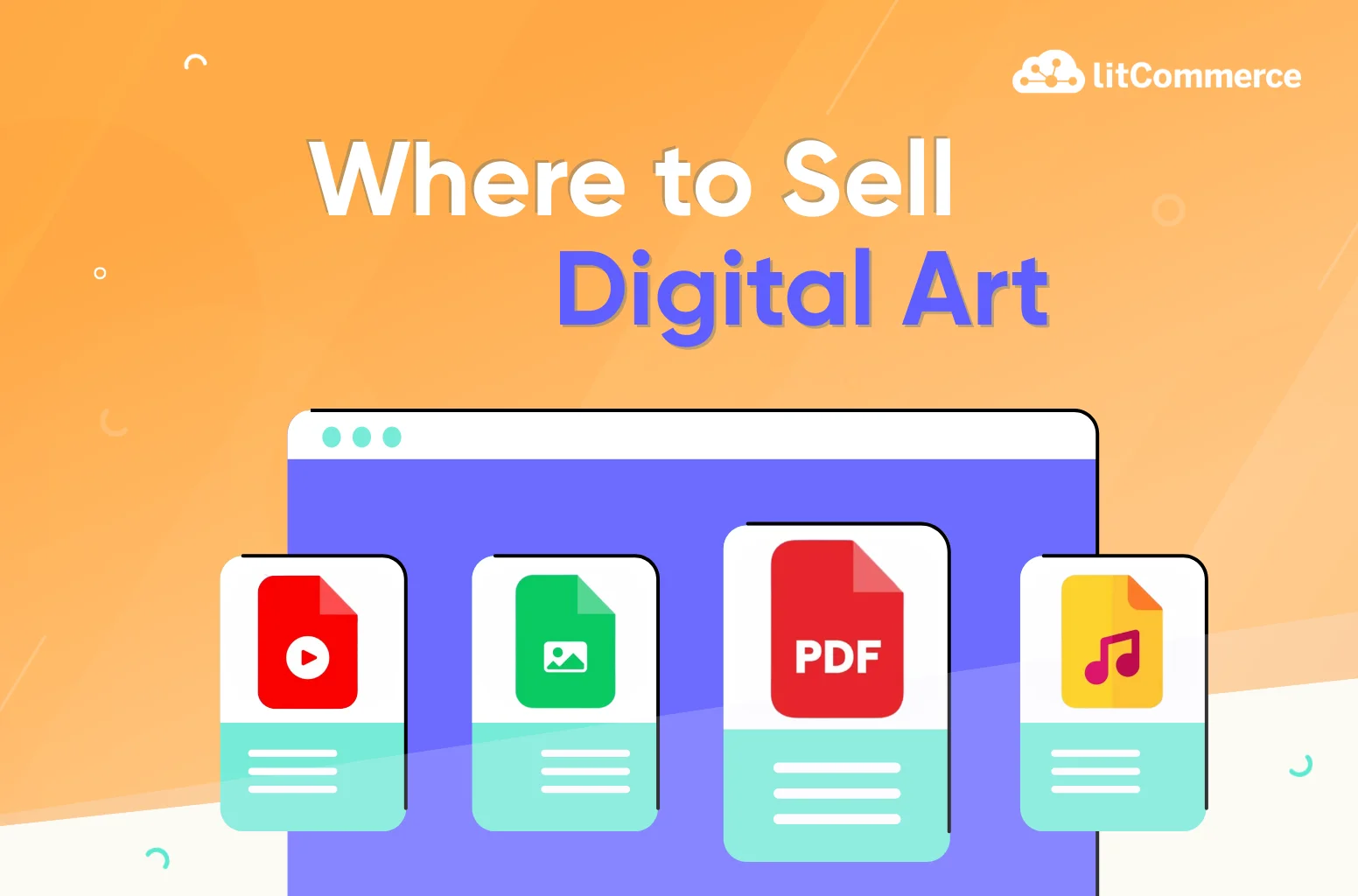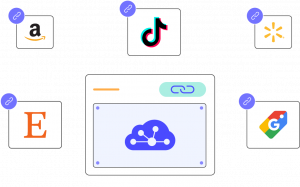Looking to turn your digital art into profit? Whether you specialize in computer graphics, digital paintings, or even cutting-edge crypto art and NFTs, there’s a thriving marketplace waiting for your talent. In this exploration, we’ll give you a list of the best websites where to sell digital art, including 20+ sites from online marketplaces to website builders.
Let’s delve into the top 20+ best places to sell digital art right now.
Boost Your Digital Art Sales with LitCommerce
Why sell your digital art on just one marketplace? Expand your sales through multiple channels with LitCommerce integration tools.
Where to Sell Digital Art? – 16 Online Marketplaces & Graphic Design Platforms
If you’re wondering where to sell my digital art, then below are the top 16 platforms and apps to sell digital art online:
Platform | Pros | Cons | Selling Fees | Who Best For |
Etsy | Large marketplace, easy to start, low barrier, built-in audience, passive income | Saturated, rising fees, limited branding, intense competition | $0.20/listing, 6.5% transaction, ~3% payment | Indie artists, creators testing demand |
Saatchi Art | High-end buyers, handled marketing/shipping, global reach | High 40% commission, tough competition, hard to build loyal fanbase | 40% commission | Professional artists, those with exhibition record |
Creative Market | Digital-only, no listing fees, large variety, passive after upload | 30–50% commission, limited payout, small customer base, payout only monthly | 30–50% commission | Designers, clipart/font creators, digital asset pros |
ArtPal | No listing fees, keep 100% on own products, print-on-demand built-in | No built-in marketing, low buyer engagement, variable commissions on POD | No commission (own sales), cut on POD sales | Beginners, those wanting 0 upfront cost |
Fineartamerica | Free to join, easy setup, handles print/shipping, no upfront cost | Highly saturated, must drive own marketing, low earning per sale | Base price + your markup (POD prints) | Photographers, digital, and traditional artists |
Artfinder | Free to join (basic), global audience | 40–45% commission, certain plans cost monthly fee | 40–45% commission, paid plans available | Physical/digital artists, those wanting exposure |
SINGULART | Curated, personal support, helps price, strong marketing for artists | Selective entry, subscription plans, commission up to 45–50% | 45–50% commission, subscription plans | Established artists with proven record |
Artnet | Prestigious marketplace, no commission, wide gallery/user base | $1,000–3,000/yr fee, not beginner-focused, little support | $1,000–$3,000 annual | Gallery artists, established professionals |
Adobe Stock | Global reach, passive, 33% royalty, high-end buyers | Very competitive, random income distribution, payout threshold, quality standards | 33% royalty | Photographers, illustrators, vector artists |
Freepik | Huge demand, easy for assets/digital products, premium plan boosts rights | Attribution for free assets, saturation, license complexity, need customization | Contributor royalties (variable) | Designers, illustrators, mass-market asset creators |
YouWorkForThem | Approval-based, curated, global reach | Applying required, unclear commission/onboarding process | Not public (approval needed) | Professional graphic designers/ typographers |
Society6 | Passive, easy store setup, print-on-demand, keep rights, no upload limit | Tiny profit margins, fees for >10 uploads or >10% royalty, postage fee on each sale | Free tier ($0), $13/mo for pro, 10%–extra royalty | Print-on-demand creators, those wanting easy POD |
Redbubble | Free to join, easy setup, control over markup, wide reach | 20% commission, transaction fees, variable artist margin, saturated, new fees in 2023 | 20% commission, transaction fees | POD artists, hobbyists, experimental sellers |
Amazon Art | Huge audience, integrates POD, global marketing | Subscription ($39.99/mo), 8–15% referral/ commission, tough category approvals | 8–15% referral, $39.99/mo or $0.99/item | Pro artists, those wanting mass-market sales |
OpenSea | Top NFT marketplace, wide audience, simple UI, royalties for secondary sales | 2.5% commission, gas fees, volatile crypto market, high competition | 2.5% fee, variable gas fees, optional royalties | Crypto artists, NFT creators, digital collectible creators |
Rarible | NFT-focused, community governance, easy NFT minting, royalty system | 2.5–15% commission, gas fees, more for beginners, competitive NFT scene | 2.5–15% commission, gas fees | NFT creators, artists wanting social/NFT utility |
#1. Etsy – The go-to marketplace for digital downloads & prints
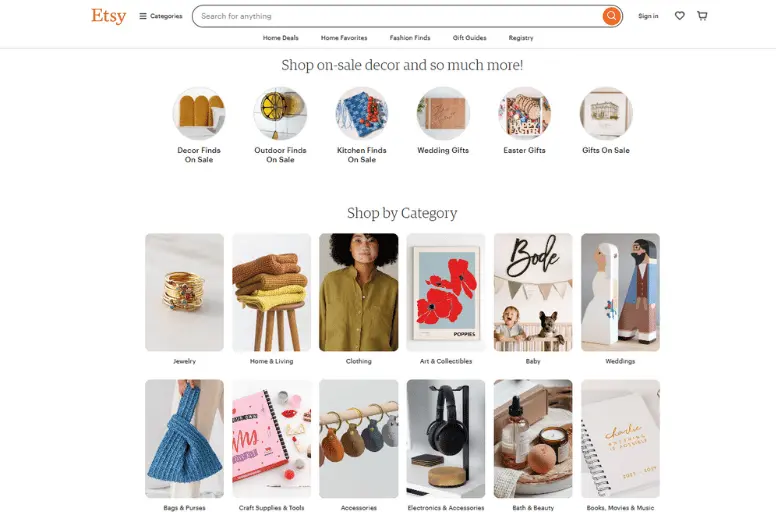
If you’re unsure where to sell digital art, Etsy is often the first place artists turn. It’s an established marketplace focused on handmade, vintage, and digital products. By 2025, Etsy had nearly 100 million active buyers, giving you an immense pool of potential customers.
The strengths are clear. You get a large audience, simple setup, and low startup cost. Digital downloads can even bring passive income while you sleep. That’s why Etsy is so appealing to beginners, indie artists, and side hustlers testing demand for digital products.
But there are downsides you need to know. Etsy has rising fees, high competition, and limited branding control. It also keeps customer data, and sudden account suspensions are possible. Fees include $0.20 per listing, a 6.5% transaction fee, and about 3% + $0.25 for payment processing.
Even with its flaws, Etsy remains one of the best places to sell paintings and digital downloads if you want quick exposure.
Read more about selling on Etsy:
#2. Saatchi Art – A global stage for fine digital art collectors
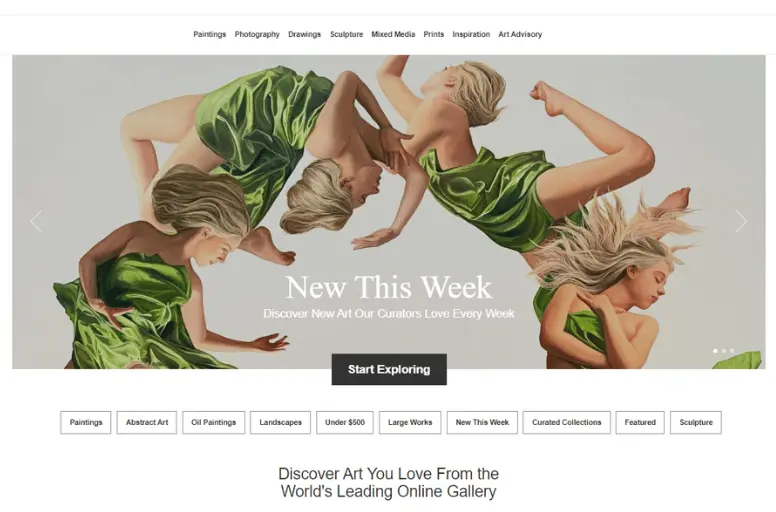
Saatchi Art feels less like a marketplace and more like an international gallery. It’s a curated platform where your digital art sits alongside paintings, photography, and limited editions. With over 1 million artworks represented from 100+ countries, the platform is designed to put you in front of collectors worldwide.
The real strength of Saatchi is its support system. You don’t have to stress about shipping: Saatchi handles that part once a sale is made. Collections and special promotions also give your work extra visibility, which can lead to serious opportunities if your portfolio stands out.
Of course, the trade-off is cost. Saatchi takes a 40% commission on every sale, and it can take effort to stand out among so many artists. You’ll also need to promote your own work and set prices that account for handling fees. Still, if you’re searching for where to sell digital art online with global credibility, Saatchi is one of the best websites to sell art professionally.
#3. Creative Market – The hub for digital assets & design resources
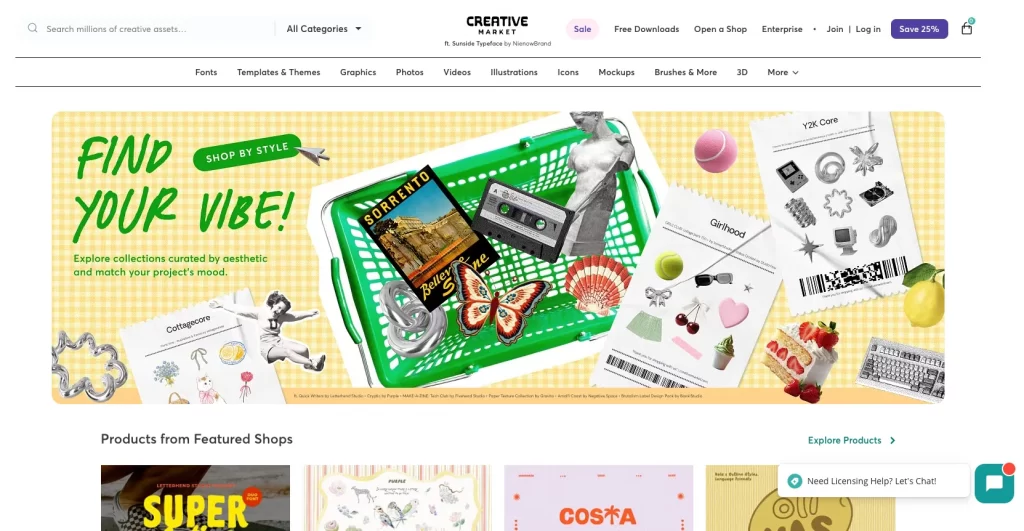
If you’re a digital designer, illustrator, or asset creator, Creative Market is built with you in mind. Unlike many online art selling platforms, this one specifically targets buyers looking for digital assets—graphics, fonts, templates, and of course, digital art. With more than 7 million users, you get direct access to a creative audience that actively shops for work like yours.
The pros make it attractive: no listing fees, the chance to earn passive income, and a marketplace full of people searching for digital resources. However, the downsides are worth noting. Creative Market takes a 30–50% commission on each sale, payouts only happen monthly, and you must reach a minimum sales threshold before withdrawing your earnings.
Still, if you’re asking where is the best place to sell digital art to fellow creators and professionals, Creative Market is a strong choice. It’s a platform where your work feels at home and has clear earning potential.
#4. ArtPal– Commission-free gallery for every artist
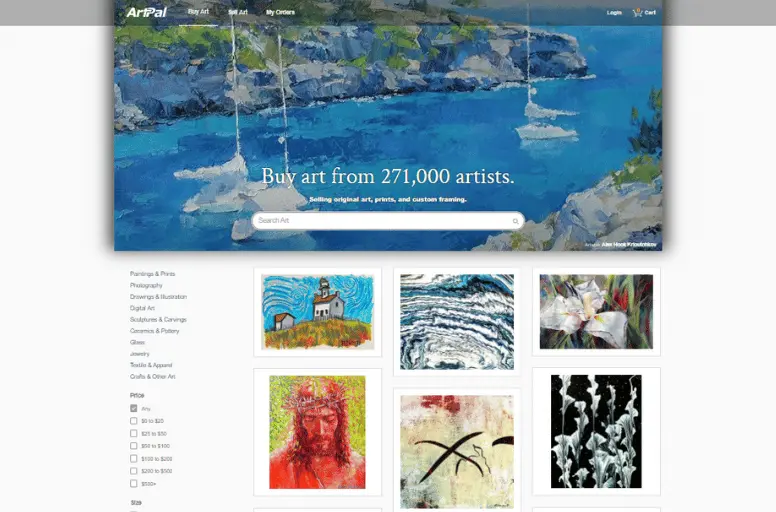
Let’s be honest, ArtPal isn’t perfect. The platform has low buyer engagement, very little built-in traffic, and most of the marketing is up to you. If you don’t promote your own work, your listings may sit unnoticed among the hundreds of thousands of artworks already posted.
But here’s the upside. ArtPal is completely free for digital direct sales, with no listing or commission fees. You get full control over your pricing, and sales can even become passive income once your art starts gaining traction. The platform also supports print-on-demand, though those sales include a commission.
For beginners or artists on a tight budget, this platform is appealing. It’s one of the few websites for artists to sell work without upfront costs. If you’re wondering where to sell digital art for free, ArtPal is a solid place to experiment and learn.
#5. Fineartamerica– Print-on-demand meets licensing opportunities
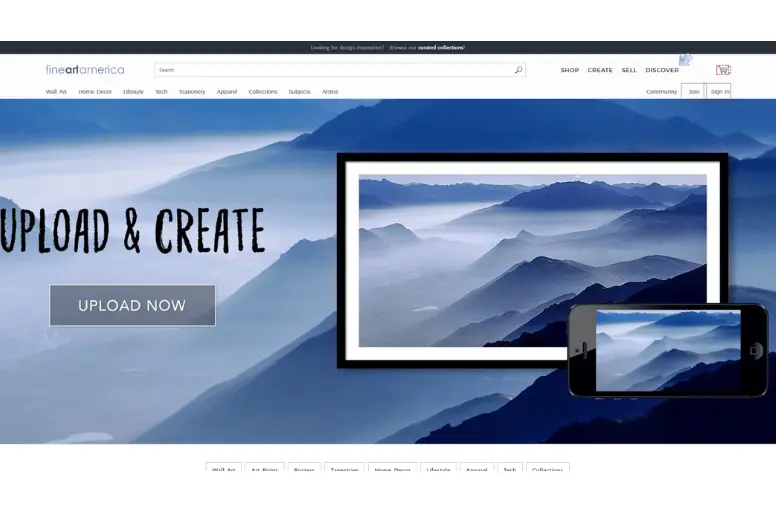
Fine Art America is one of the largest digital art selling platforms built around print-on-demand. You can upload your digital work and have it turned into prints, posters, or even products like mugs and t-shirts. With over 500,000 artists and millions of images already listed, the platform offers scale and convenience.
The main advantage is ease. You don’t have to worry about printing, packaging, or shipping. Fine Art America handles everything. The platform is user-friendly, and you can set your own markup to control profits. It’s a great fit for digital artists, illustrators, or photographers who want POD solutions.
However, there are trade-offs. The marketplace is highly saturated, earnings per sale can be low on some products, and you must promote yourself to stand out. Still, for many artists, Fine Art America is among the best websites to sell art if you want simple tools and a wide product range.
#6. Artfinder – Curated marketplace for unique & original art
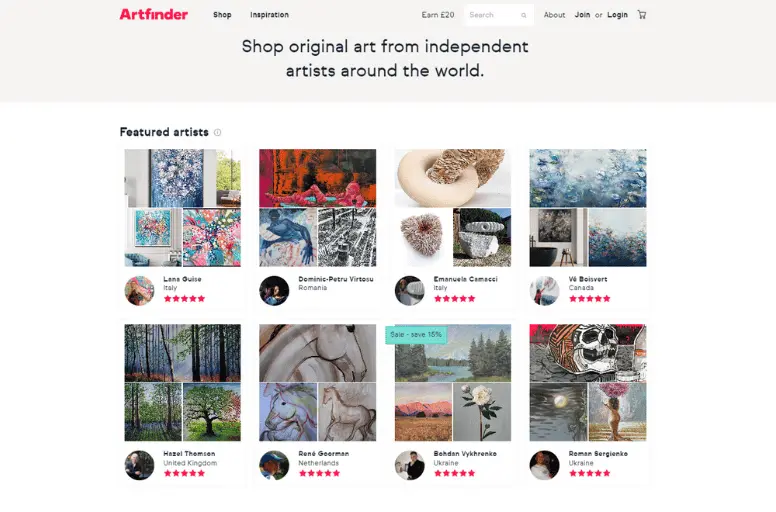
One of Artfinder’s biggest strengths is credibility. Every artist goes through a curation process, which instantly makes your work feel more trusted. You also gain access to an international community of buyers and fellow artists, giving you both exposure and support. For serious creators wondering where to sell my digital art, this kind of selective platform can be a game-changer.
But exclusivity comes with limits. Approval is required before you can sell, and once accepted, you face high commissions of 40–45%. There are two selling plans: a free basic option and a pro plan with a monthly fee for added visibility.
Artfinder currently features over 6,000 artists and tens of thousands of artworks. For professional or dedicated digital creators, it’s one of the best platforms to sell art globally if you’re ready for competition and willing to invest in your presence.
#7. SINGULART– Premium online gallery with international reach
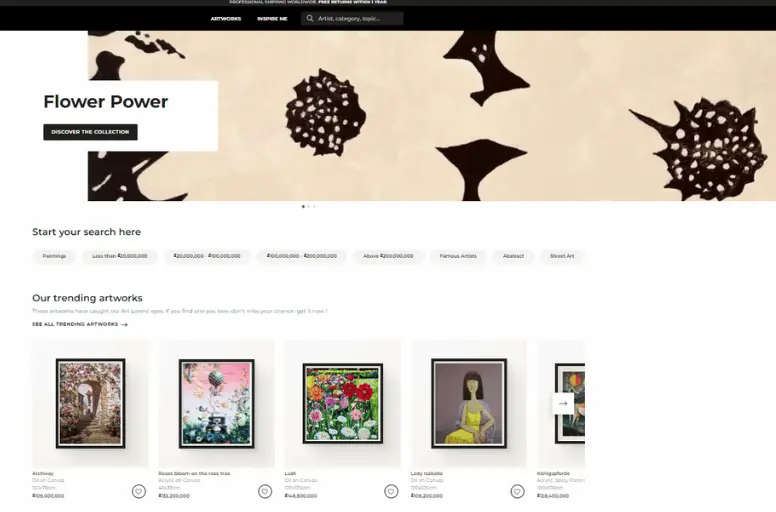
SINGULART features thousands of carefully curated artists and connects them with an international collector base. This focus on high-quality, professional work makes it stand out among other platforms. If you’re wondering where to sell digital art commissions or showcase premium originals, the numbers show that SINGULART attracts serious buyers worldwide.
The strengths are impressive. You receive personalized support, benefit from strong marketing campaigns, and gain exposure to high-end collectors who value originality. The platform’s curated model ensures that your work is presented in a professional, gallery-like environment.
Still, SINGULART isn’t open to everyone. Applications are selective, commissions can reach 50%, and there are subscription plans if you want premium exposure. It’s best suited for established artists with a proven track record looking to expand globally. For creators asking where to sell digital art at a professional level, SINGULART offers credibility and reach that few others match.
#8. Artnet– Auction powerhouse for digital & traditional art
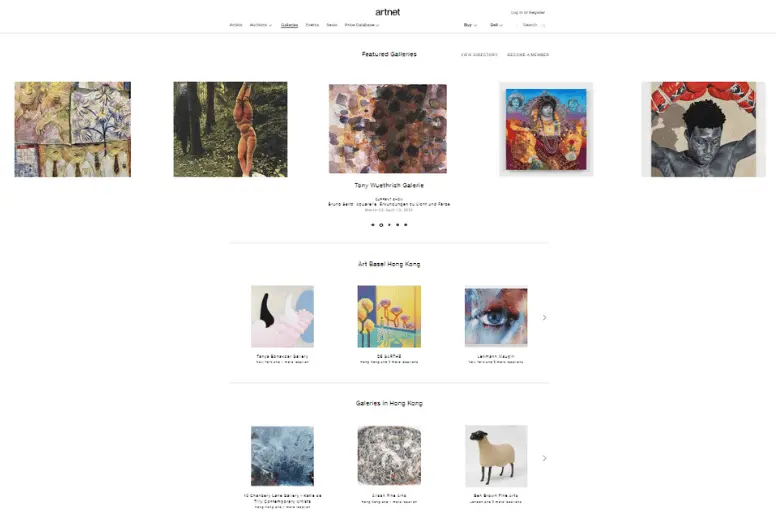
Artnet isn’t for everyone. The platform charges a steep annual participation fee that ranges from $1,000 to $3,000. This cost makes it less accessible for hobbyists or beginners and much better suited to established professionals. It also isn’t the place for mass-market digital downloads—the focus here is on serious, gallery-level work.
That said, the upside is significant. Artnet is one of the best art selling websites for high-value pieces, attracting a global audience of collectors who trust its respected brand. With millions in annual art sales, the platform carries weight in the contemporary and modern art world.
If you’re a professional gallery artist or an experienced digital creator with a strong portfolio, Artnet provides an exclusive space to sell. Among premium digital art platforms, it’s a powerful option for those aiming at serious collectors and high-ticket sales.
#9. Adobe Stock – Professional platform for designers & creators
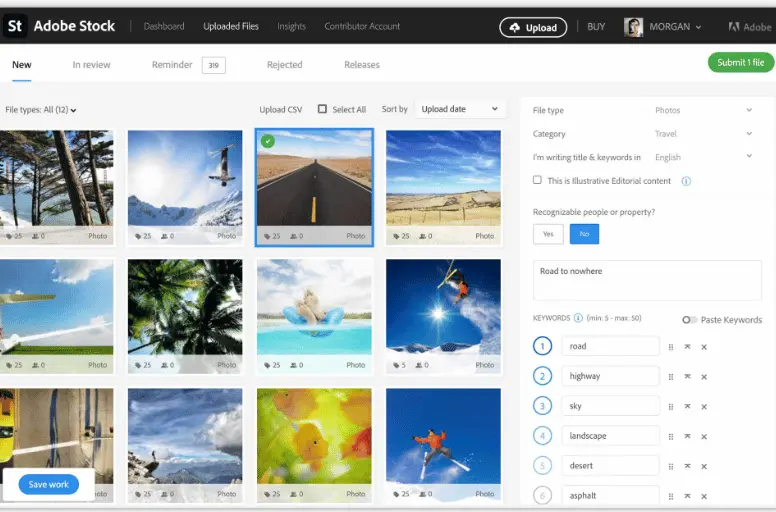
If your goal is to sell directly to designers, marketers, and creative teams, Adobe Stock is the right fit. As part of Adobe Creative Cloud, it integrates seamlessly into the tools professionals already use. That makes it a natural choice if you’re searching for the best place to sell art online with real commercial value.
Adobe Stock boasts an impressive scale, with over 100 million assets available and thousands of active contributors. You earn a 33% royalty per download, which can add up to consistent passive income over time. For digital illustrators, photographers, and vector artists, the potential reach is massive.
Still, competition is intense. Every submission goes through strict acceptance criteria, and you must meet a payout threshold before cashing out. Yet despite these hurdles, Adobe Stock remains one of the strongest platforms for digital art creators who want global exposure and trusted clients.
#10. Freepik – High-volume marketplace for vectors & illustrations
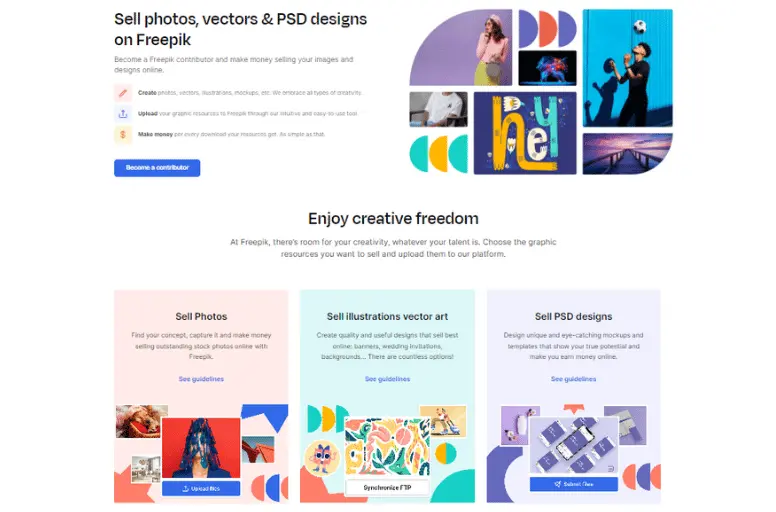
Freepik boasts over 100 million monthly downloads, making it one of the biggest platforms for vectors and illustrations worldwide. That level of activity is hard to ignore if you’re looking for the best place to sell art in a digital, mass-market format.
The advantages are clear. Freepik gives you access to a huge buyer base, and it’s ideal if your work fits commercial or everyday design needs. For illustrators and digital designers who can produce assets quickly, the platform provides consistent visibility and traffic.
But royalties can be low, usually around 20–50% depending on your status. To build steady income, you’ll need to upload a large volume of files and keep your portfolio active. Freepik is most suitable for artists focused on mass-market assets rather than limited-edition pieces. If quantity and reach matter to you, it’s a strong option in the digital stock world.
#11. YouWorkForThem – A curated shop for creative professionals
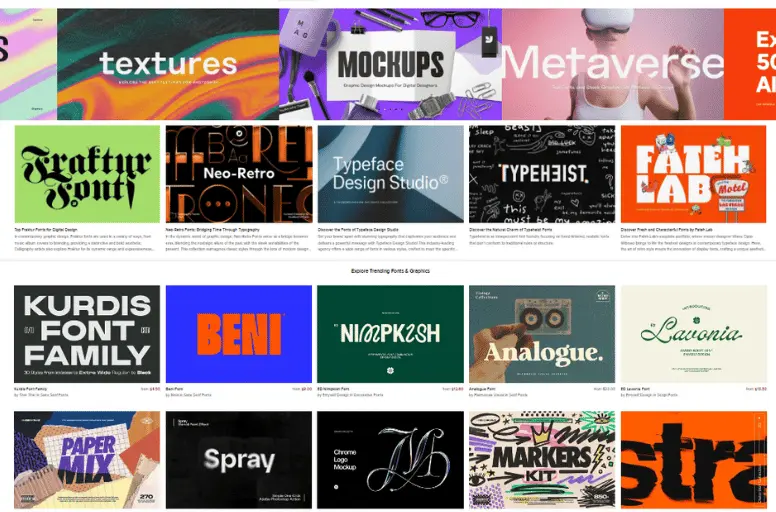
One of YouWorkForThem’s biggest strengths is its focus on quality. The platform attracts a curated, design-savvy audience that values originality. It’s especially supportive of professional designers, typographers, and digital asset creators who want their work appreciated in the right context.
If you’re searching for the best websites for selling art in the form of fonts, graphics, or digital resources, this boutique marketplace stands out.
However, it isn’t open to everyone. You’ll need to go through an application and approval process, and the commission rates aren’t publicly disclosed. That lack of transparency can be a drawback for artists who prefer clear terms upfront.
Founded in 2001, YouWorkForThem has built a strong reputation in the design community. While not the largest marketplace, it offers credibility and a focused buyer base that values curated work over mass-market assets. For professionals, it’s a refined place to showcase and sell digital creations.
#12. Society6 – Turn art into home décor & lifestyle products
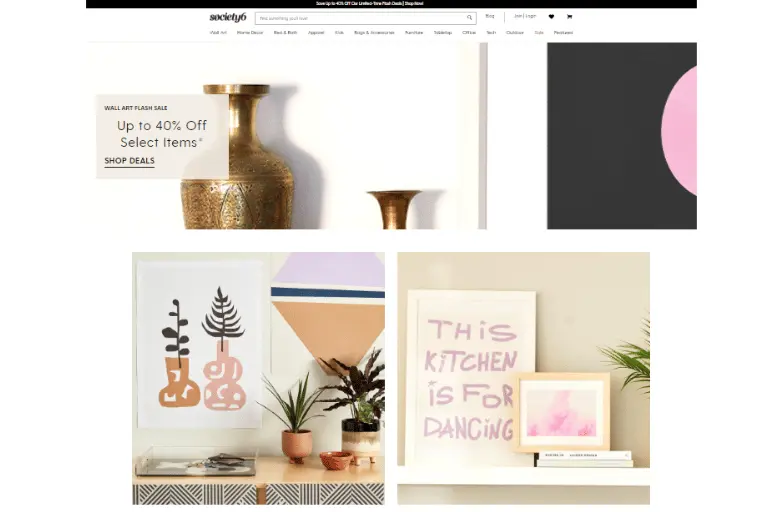
Society6 attracts customers who want to bring creativity into their homes and lifestyles. Millions of buyers browse each month for prints, wall art, décor, and apparel featuring original designs. If you’re wondering where to sell digital art that can live beyond the screen, Society6 is built for that.
The platform makes things simple. Setup is easy, the product range is wide, and passive income is possible once your designs are uploaded. You don’t have to worry about production or shipping, Society6 handles all of that for you.
But profits can be slim. On art prints, you earn a 10% commission, and to set higher markups or upload more than 10 products, you’ll need the Pro plan at $13 per month. For emerging artists or digital creators testing print-on-demand, though, Society6 is an accessible way to start and grow.
#13. Redbubble – Pop-culture print-on-demand for artists
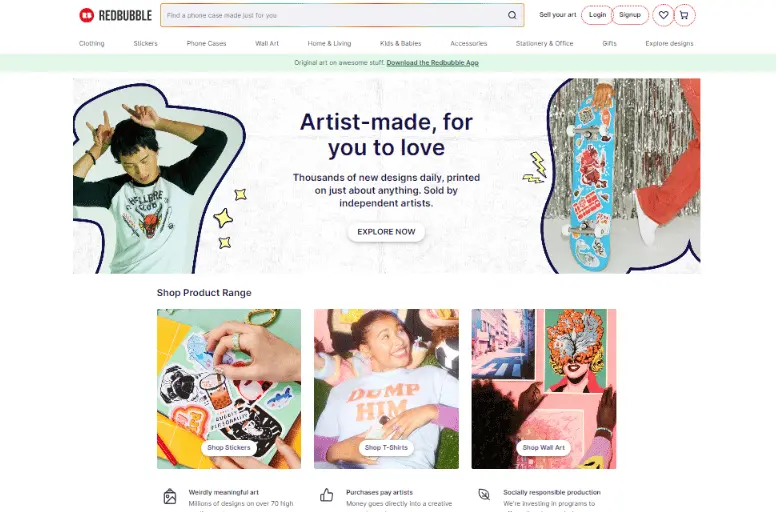
The truth about Redbubble is that it can feel overwhelming. Recent platform fee changes and a base 20% commission make profits smaller than many artists expect. On top of that, it’s a very saturated space, with hundreds of thousands of creators competing for attention.
You can refer to Redbubble’s fee table for more details.
Even with these downsides, Redbubble is still one of the most popular digital art selling platforms. It has more than 700,000 active artists and millions of buyers worldwide. You don’t pay upfront costs, which makes it easy to start, and you can earn passive income once your designs are uploaded. Plus, you control your markup to increase earnings on top of the base fee.
For hobbyists, side hustlers, or new digital artists, Redbubble offers a beginner-friendly way to test the waters. While competition is intense, it’s still a practical entry point into the print-on-demand world.
#14. Amazon Art – Massive exposure for fine art & collectibles
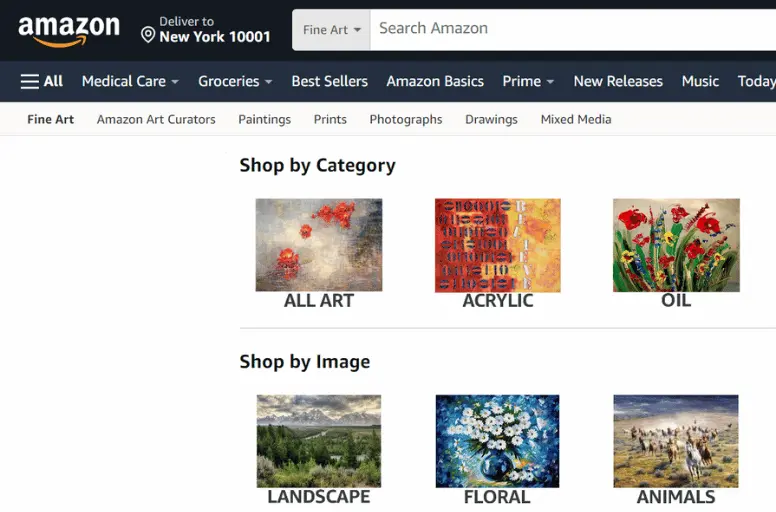
Amazon Art was created to give fine art a space within one of the world’s biggest marketplaces. Unlike casual online art selling platforms, it focuses on original, high-quality work and pairs it with Amazon’s trusted checkout and worldwide shipping system. With over 300 million users across Amazon, the potential exposure is unmatched.
The pros are clear: you join into a massive customer base and gain trust through Amazon’s brand. However, it comes at a cost. Selling requires approval through a tough application process, a $39.99 monthly Pro Seller subscription, and referral fees between 8–15% per sale.
Amazon Art is best suited for established, professional artists ready to navigate strict onboarding. While not ideal for beginners, it offers serious global visibility for creators who want to connect fine art with one of the largest online shopping audiences in the world.
#15. OpenSea – The largest NFT marketplace for digital creators
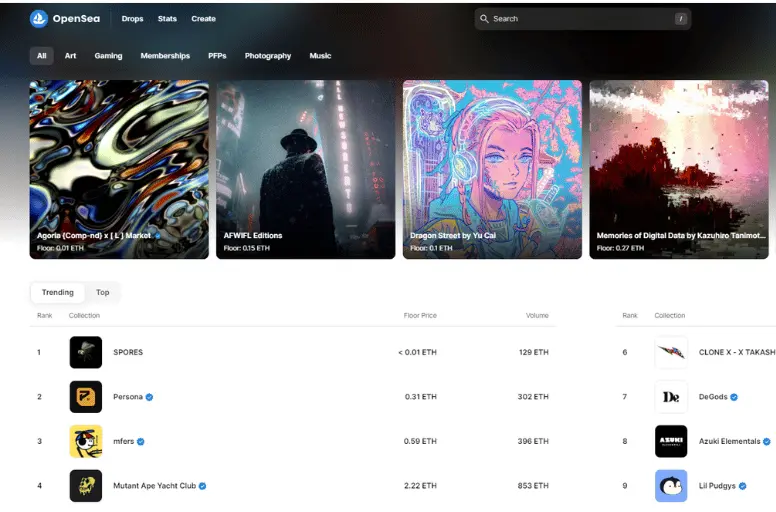
OpenSea has become the giant of NFT trading, recording billions in lifetime sales and attracting over one million active users. Those numbers alone make it hard to ignore when you ask where is the best place to sell digital art in the form of crypto collectibles.
The platform’s strengths include a large NFT buyer base, the ability to earn royalties on secondary sales, and support for most digital file types. For artists interested in blockchain, it provides unmatched visibility in the crypto art world.
However, selling here comes with challenges. You’ll need an Ethereum wallet, and gas fees can eat into your profits. The platform also charges a 2.5% commission per sale, and crypto’s volatility means income can fluctuate.
OpenSea is best suited for NFT artists and creators exploring digital collectibles. If you’re ready for the world of crypto, it offers a massive reach and strong earning potential.
#16. Rarible – Community-driven NFT platform for crypto artists
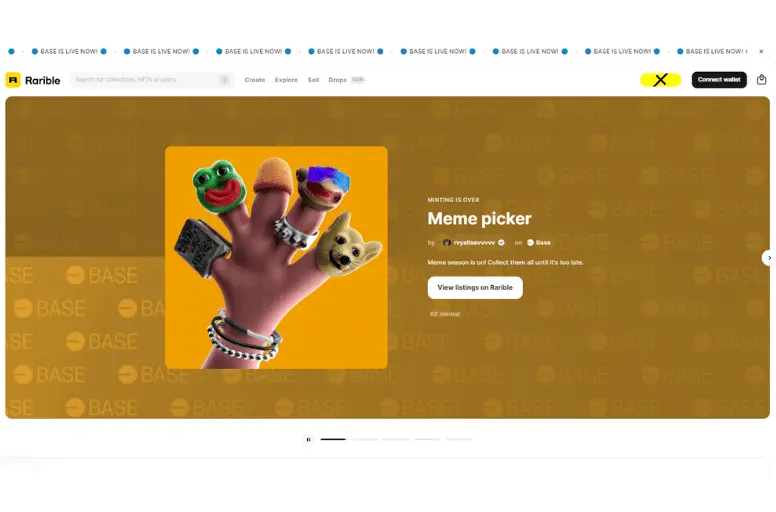
Rarible’s biggest strength is accessibility. It makes NFT minting straightforward, supports royalties on resales, and connects you to an engaged crypto audience. If you’re exploring blockchain as the best place to sell art online, Rarible gives you tools to create and sell quickly.
The platform supports multiple blockchains, which makes it more flexible than some competitors. With tens of thousands of active NFT traders, your work can reach collectors across different networks. It’s a strong fit for NFT artists, digital creators, and anyone comfortable with crypto.
Still, there are drawbacks. Commissions can range from 2.5% to as high as 15%, and gas fees add extra costs. Like other NFT spaces, competition is fierce, and visibility takes effort. Rarible is best for tech-savvy artists ready to engage with community-driven selling and willing to navigate the volatility of the crypto art market.
Where to Sell Digital Art Online? – Top 3 Website Builders
Besides online marketplaces and graphic design platforms, website builders are among the best places to sell digital art. Having your website gives you control over pricing and enables you to retain all profits. Plus, it lets you establish a direct connection with your audiences.
Now, let’s explore the top 3 websites to sell digital art:
#17. Shopify – Full control and scalability
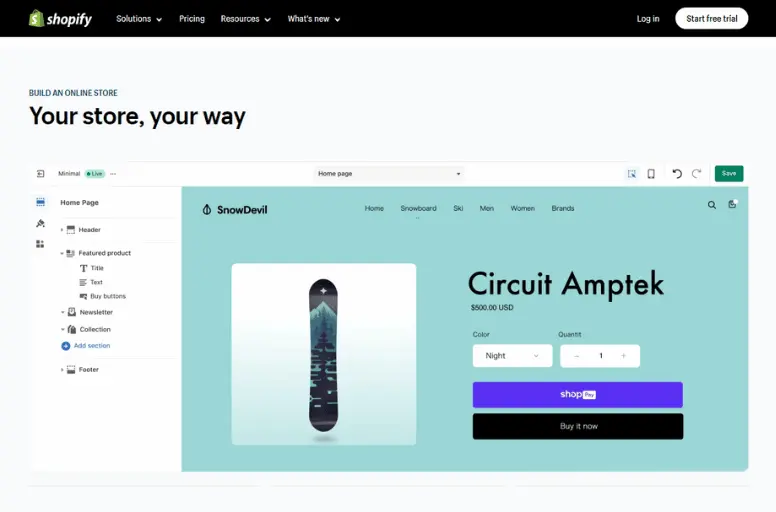
Shopify is one of the best platforms for selling digital products, particularly digital art.
It’s not just another website builder, it’s a full eCommerce platform built to help artists sell, scale, and grow. With Shopify, selling digital downloads like art, graphics, or fonts is simple thanks to its free “Digital Downloads” app or third-party integrations.
Let’s look into the reason why Shopify is considered as the best website to sell art:
- Digital product support: Shopify allows easy sale of digital downloads (art, graphics, fonts, etc.) using apps like “Digital Downloads” or third-party integrations.
- Scalable eCommerce tools: Handle everything from a single artist shop to a large brand, with automation for order processing, customer management, and analytics.
- Customizable storefronts: 100+ mobile-friendly templates, enabling visually appealing art shops that reflect your style.
- Integrated payments: Secure checkout, multiple payment gateways (including PayPal, Stripe, Apple Pay, crypto options).
- Marketing integrations: Built-in marketing, SEO, discount codes, blog, email campaigns, as well as integrations with Facebook, Instagram, and Etsy for broader reach.
- Third-party apps: Access to thousands of add-ons for email marketing, print-on-demand, analytics, memberships, and more.
- Global reach: Sell to customers worldwide with support for multiple currencies, tax calculations, and language options.
- Customer support: 24/7 support via chat, email, and phone.
Shopify is global at its core, with multi-currency support, tax tools, and language options. Pricing starts at $29/month, with no extra fees if you use Shopify Payments. Transaction rates in the U.S. are 2.9% + 30¢ per sale.
For digital artists who want control, scalability, and a professional store, Shopify is one of the best solutions to build a brand and sell worldwide.
#18. Squarespace – Elegant portfolios with built-in selling

If you’re wondering where to sell digital art while also showcasing your work beautifully, Squarespace is a strong choice.
It’s known for its stunning, artist-focused templates that make portfolios look professional with minimal effort. Every site is mobile-optimized, so your buyers always get a smooth experience whether they’re shopping on desktop or phone.
So, why Squarespace is deserved to be on this list:
- Beautiful templates: Squarespace offers visually striking, artist-focused templates that highlight digital art and portfolios elegantly.
- Easy digital downloads: Built-in e-commerce lets you securely sell digital products (art prints, files, templates) directly to customers with instant delivery.
- User-friendly: Drag-and-drop editor is intuitive for beginners, no coding required to build a professional site.
- Integrated marketing: SEO tools, email marketing, social media integration, blog, and analytics are included to grow your audience.
- Print-on-demand compatible: Integrates with third-party services for selling print products, in addition to digital files.
- Mobile-optimized: Every site looks great on mobile devices, ensuring a smooth buying experience.
- Secure payments: Accepts credit cards, PayPal, Apple Pay, and more.
Pricing starts at $16/month for portfolios, $23/month for business with a 3% transaction fee, and $27/month for Basic Commerce (no transaction fees). Advanced Commerce at $49/month adds extra eCommerce tools.
Squarespace is best for artists who want a visually stunning site that balances design and eCommerce convenience.
#19. Wix – Maximum flexibility for creative control

For artists who want freedom to design their store their way, Wix is one of the best platforms to sell art online. Its drag-and-drop editor is super intuitive, letting you create unique galleries, landing pages, and shops without any coding. With hundreds of stylish templates tailored for artists and designers, your store can match your exact creative vision.
Wix makes digital product sales easy, and here’s why:
- Drag-and-drop builder: Super-flexible, intuitive editor lets you create unique galleries, landing pages, and online stores tailored to your art brand.
- Digital product sales: Easily sell digital downloads (art, templates, music, etc.) with instant delivery; built-in e-commerce tools.
- Extensive apps marketplace: Add features like email marketing, SEO, print-on-demand, membership sales, chatbots, and more.
- Customizable templates: Hundreds of stylish, creative templates made for artists and designers.
- Integrated marketing: Includes blogs, built-in SEO, automated email campaigns, social sharing, and analytics.
- Print-on-demand integrations: Connect with services to sell art prints or merchandise alongside digital files.
- Flexible payment options: Accept credit cards, PayPal, Stripe, and more; supports global sales.
- No coding needed: Launch fast, make edits any time, and manage your store with a visual interface.
Pricing starts at $29/month for Business Basic, $36/month for Business Unlimited, and $59/month for Business VIP, which includes priority support and advanced tools.
For digital artists who want creative control, customizable design, and an all-in-one selling solution, Wix is a reliable choice that balances flexibility with ease of use.
Where to Sell Digital Art Online? – Top 3 Social Media Platforms
Once your website is set up, social media becomes an effective way to sell digital art online and expand your reach. These platforms help you connect with potential buyers and build a following that values your creative process and style.
#1. Instagram – Visual storytelling for artists
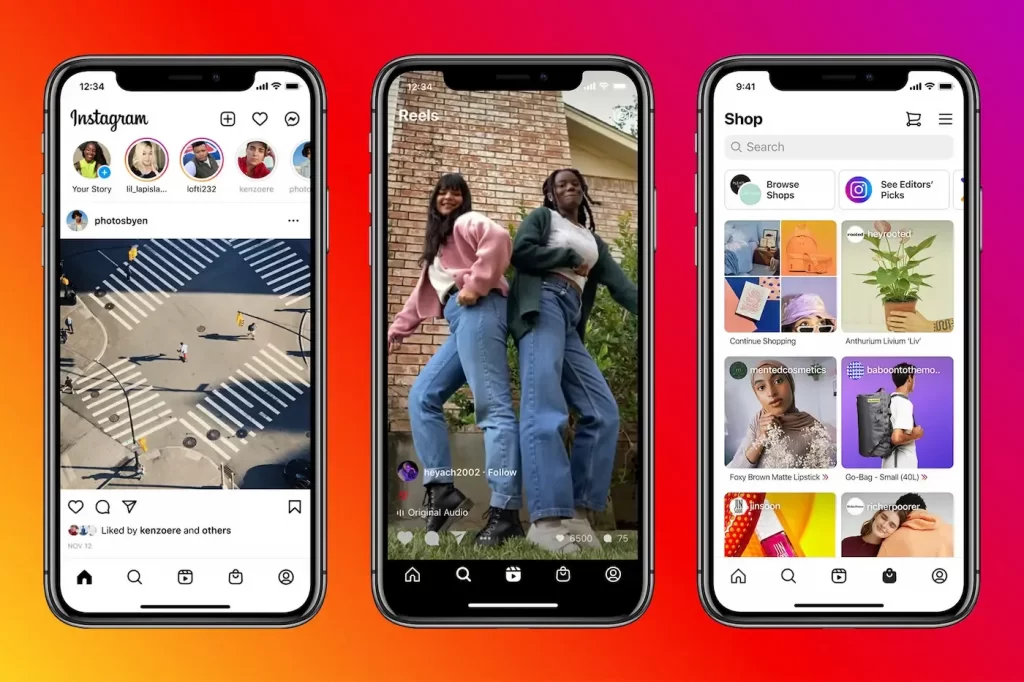
Instagram is one of the most powerful platforms for digital artists because it’s built around images and creativity. With over 1 billion active users, it gives you a massive audience to share your art. Posts, Stories, and Reels let you showcase your work like an online gallery while building a personal connection with fans.
The selling tools are strong, too. Features like Instagram Shopping and product tags allow buyers to purchase directly from your feed. Combined with DMs and collaborations, you can turn casual followers into loyal customers.
While it isn’t one of the traditional best art-selling websites, Instagram works as both a portfolio and a sales channel. It’s ideal for any digital artist looking to grow a following, engage an audience, and drive sales all within the app.
#2. TikTok – Viral growth for digital artists

TikTok is the fastest-growing social platform and a strong place to share your art with new audiences. Short-form videos make it easy for digital art to go viral, whether you post process clips, tutorials, or quick time-lapse pieces. The playful, creative format helps you connect directly with viewers and build loyal communities.
Selling through TikTok is also straightforward. Features like TikTok Shop and simple “link in bio” tools let you guide followers to your store, Etsy shop, or website. With consistent content, you can transform casual views into paying customers.
Unlike many of the best art-selling websites, TikTok doesn’t feel like a marketplace; it’s an engagement engine. It’s best for dynamic artists who enjoy video, love experimenting with trends, and want the chance for rapid audience growth.
#3. YouTube – Build authority and sell through content
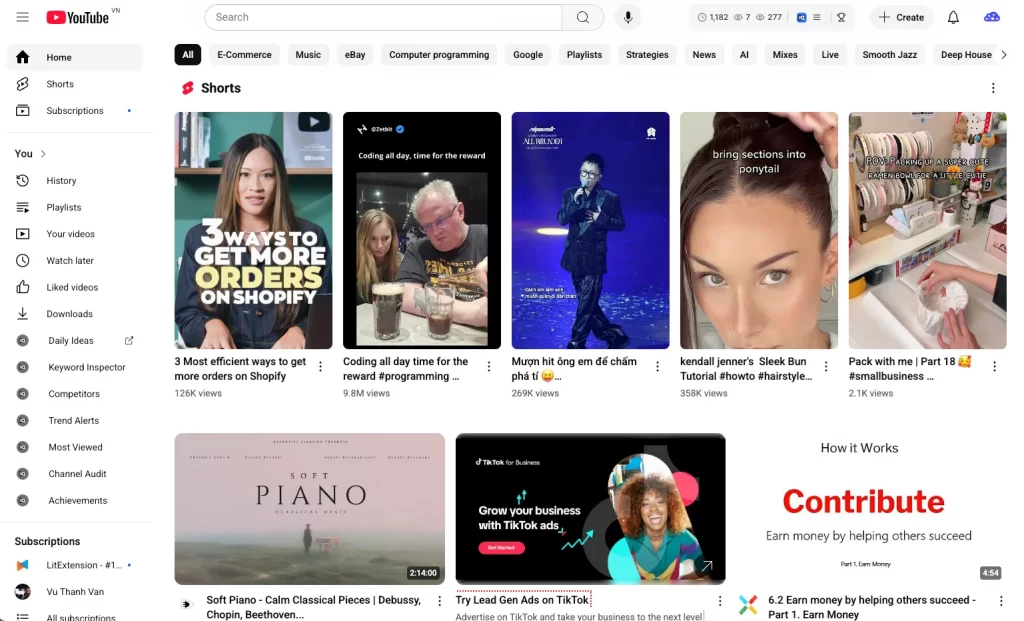
YouTube is the world’s leading video platform with over 2 billion monthly users, making it a powerful tool for digital artists. Long-form videos let you dive deep into your process, share tutorials, or document projects in ways that build authority and trust. This storytelling approach helps you connect with viewers who may later become buyers.
The platform also integrates with shopping features, allowing you to link directly to your art shop or commission page. Beyond art sales, YouTube offers extra income opportunities through ads, sponsorships, and memberships. That means you’re not only growing an audience but also building multiple revenue streams.
While it’s different from traditional online art selling platforms, YouTube works best for artists who enjoy creating longer content and want to grow a brand alongside sales. If you’re willing to invest time in videos, the long-term rewards can be significant.
If you’re looking for the best place to sell digital art, don’t overlook the power of social platforms. They help you grow a genuine community while creating natural opportunities to sell digital art.
How to Sell Digital Art? – 6 Easy Steps for Beginners
Selling digital art online in 2026 is more accessible and profitable than ever, thanks to a wide range of platforms, evolving technology, and a global audience eager for unique digital creations.
Step 1: Prepare your digital art
Ensure your artwork is in high-quality digital formats, such as JPG, PNG, SVG, or PSD. Organize your portfolio by curating your best pieces and consider offering themed collections or bundles.
Step 2: Choose the right platform
Picking the right platform to sell digital art online depends on your goals—whether you’re looking for exposure, creative freedom, or passive income. Here are some top choices to consider in 2026:
- Online marketplaces like Etsy, Creative Market, Artfinder, Fineartamerica, and Saatchi Art are perfect for reaching art buyers quickly. They offer built-in audiences and easy setup for selling digital artwork.
- Print-on-Demand platforms such as Society6, Redbubble, and Amazon Art let you sell your digital art on physical products like apparel, posters, and home decor without handling inventory.
- Stock image sites like Adobe Stock, Freepik, and YouWorkForThem are ideal for licensing your work for commercial use, providing recurring income from downloads.
- NFT marketplaces such as OpenSea and Rarible allow you to mint and sell unique digital pieces with blockchain authentication.
- Your own website using Shopify, Wix, or Weebly gives you full control over branding, pricing, and customer experience.
- Social media platforms like Instagram, TikTok, and YouTube are great for building a loyal following and turning fans into customers through direct promotion and shop integrations.
Step 3: Set up your shop
Create compelling listings with high-quality images, detailed descriptions, and clear pricing. Automate delivery through instant digital downloads and define licenses to protect your work.
Step 4: Promote your digital art
You can start by using social media to share your art and connect with new people. Then, try teaming up with other artists and joining online communities to grow your audience. Finally, make sure your product titles and posts include the right keywords so more people can find your digital art.
Step 5: Explore new trends
To grow your income, it’s a good idea to keep up with new trends like NFTs and print-on-demand. This way, you can find fresh ways to earn from your art.
For example, you can sell your designs on products like t-shirts, mugs, or wall art, without handling any shipping yourself. You can also offer licenses for your art on stock sites or your own website, so people pay to use your work again and again.
Step 6: Optimize your selling performance
You should reply to customer questions quickly and kindly ask for reviews to build trust. Then, keep a close eye on your sales, try different prices, and update your products based on what buyers prefer. To stay safe, add watermarks to your preview images and clearly explain how people can use your art.
Where to Sell Digital Art – FAQs
Where is the best place to sell digital art?
The best place depends on your goals. Marketplaces like Etsy are great for beginners because they have huge built-in audiences. Platforms like Shopify or Squarespace give you full control if you want to build a brand. Social media sites like Instagram or TikTok are powerful for exposure and driving traffic. For high-end sales, curated galleries such as Saatchi Art or SINGULART are well-suited.
How do I sell my digital art?
Start by deciding where you want to sell: marketplaces, your own website, or social media. Create high-quality digital files, package them clearly, and price them competitively. Upload your work with strong titles, descriptions, and relevant keywords so that people can easily find it. Then promote your shop through Instagram, TikTok, or YouTube to bring in consistent traffic and sales.
Is it worth selling digital art?
Yes, if you approach it the right way. Digital art has low overhead because you only create a file once and can sell it many times. Passive income is possible through downloads, prints, or even licensing. The key is building visibility and marketing your work, since competition is high. Over time, digital art can absolutely become a worthwhile income stream.
Can you sell AI art?
Yes, you can sell AI-generated art, but it comes with extra considerations. Many marketplaces now allow AI-generated art, but some require you to label it as such clearly. Copyright and originality can be tricky, so it’s essential to check each platform’s rules. If you use AI as part of your creative process, be transparent with buyers. Done thoughtfully, AI art can be sold as prints, downloads, or even NFTs.
Start Selling Digital Art Now!
In conclusion, regarding where to sell digital art online, there are several fantastic platforms to explore. From the user-friendly and worldwide reach of Redbubble to the contemporary art scene on Artnet and the versatile eCommerce tools of Shopify, artists have diverse options to explore.
Whether you’re an experienced artist or new to the scene, these platforms offer great opportunities to showcase and sell your digital creations to a global audience.
So, why wait? Start your digital art-selling journey today and unleash your creativity to the world!If you still have any questions relating to selling digital art, feel free to contact us anytime.

